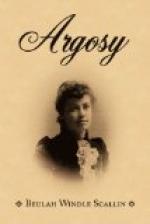A MEMORY.
How much of precious joy,
that leaves no pain,
Lives in the simple
memory of a face
Once seen, and
only for a little space,
And never after to be seen
again:
A face as fair as, on an altar
pane,
A pictured window
in some holy place—
The glowing lineaments
of immortal grace,
In many a vague ideal sought
in vain.
Such face was yours, and such
the joy to me,
Who saw you once,
once only, and by chance,
And cherished evermore in
memory
The noble beauty
of your countenance—
The poet’s natural language
in your looks,
Sweet as the wondrous sweetness
of your books.
GEORGE COTTERELL.
AUNT PHOEBE’S HEIRLOOMS.
An Experience in Hypnotism.
We do not take to new ideas readily in Bishopsthorpe. Our fashions are always at least one season behind the times; it is only by a late innovation in Post Office regulations that we are now enabled to get our London papers on the day of their publication; and a craze, social or scientific, has almost been forgotten by the fashionable world before it manages to establish any kind of footing in our midst.
It therefore came upon us with more or less of a shock one morning a short time ago to find the walls of our sleepy little country town placarded with naming posters announcing that Professor Dmitri Sclamowsky intended to visit Bishopsthorpe on the following Friday, for the purpose of exhibiting in the Town Hall some of his marvellous powers in Thought Reading, Mesmerism, and Hypnotism.
Stray rumours from time to time, and especially of late, had visited us of strange experiments in connection with these outlandish sciences, if sciences they can be called; but we had received these with incredulity, mingled with compassion for such weak-minded persons as could be easily duped by the clever conjuring of paid charlatans.
This, at least, was very much the mental attitude of my aunt Phoebe, and it was only under strong pressure from me and one or two others of her younger and more enterprising section of Bishopsthorpe society that she at last reluctantly consented to patronise the Professor’s performance in person.
Even at the last moment she almost failed us.
“I am getting too old a woman, my dear Elizabeth,” she said to me as I was helping her to dress, “to leave my comfortable fireside after dinner for the sake of seeing second-rate conjuring.”
“Indeed, it is good of you,” I said, as I disposed a piece of soft old point lace in graceful folds round the neck of her black velvet dress; “but virtue will be its own reward, for I am sure you will enjoy it as much as any of us, and as for being too old, that is all nonsense! Just look in the glass, and then say if you have a heart to cheat Bishopsthorpe of a sight of you in all your glory.”




